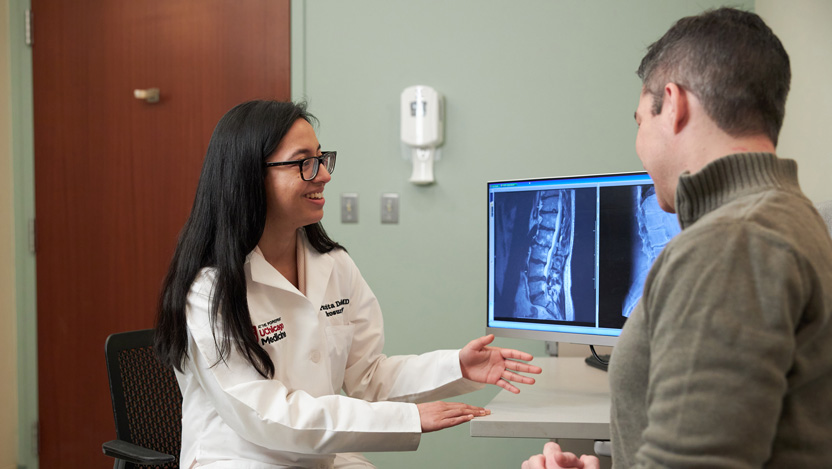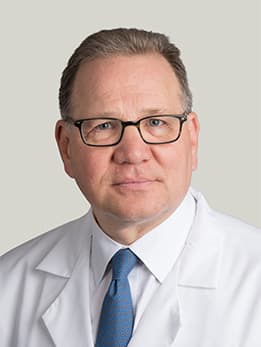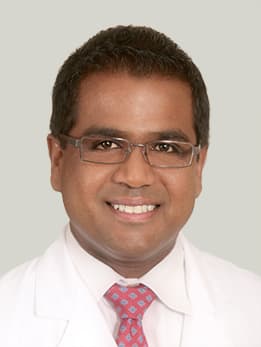Spine Pain: Causes, Conditions & Symptoms

Spine Pain Symptoms
Spine symptoms may vary for each person. Common symptoms associated with spine problems include:
- Stiffness and limited mobility: Stiffness and reduced range of motion in the back that may make it difficult to bend, twist or perform certain movements without experiencing pain or discomfort.
- Radiating pain: Back pain may radiate or travel to other body parts. For example, if a nerve is compressed or irritated, pain may radiate down the leg, known as sciatica.
- Numbness or tingling: If nerves in the back are compressed or irritated, it can cause numbness or tingling. This may even radiate to other areas, such as the legs or feet.
- Weakness or difficulty with coordination: Severe back pain or nerve compression can lead to weakness in the back or extremities. It may be difficult to perform certain tasks that require coordination or fine motor skills.
- Bowel or bladder problems: This can occur in rare cases, and you should seek immediate medical care.
Spine pain ranges in severity, duration and location. If you experience persistent or severe spine pain – especially pain that lasts for a few weeks – seek medical attention for an accurate diagnosis and appropriate treatment.
Spine Pain Causes
Spine issues is one of the most common reasons people seek medical care and miss work. According to a CDC study, 58.9 percent of adults experienced back pain over three months. Back pain can have several causes, including lifestyle factors and other underlying conditions. Common spine causes include:
- Aging and degenerative changes: As you age, the disks in the spine naturally lose hydration and elasticity, which can lead to conditions like osteoarthritis, spinal stenosis, spondylosis or herniated disks.
- Nerve damage: Spine damaged can cause pain, increased sensitivity, numbness, muscle weakness and limited/lost functionality.
- Injuries and trauma: Accidents, falls or sports injuries can result in acute or chronic spine pain or spine fractures.
- Infection: Bacteria or viruses, such as osteomyelitis, can infect the bones of the spine.
- Congenital or structural abnormalities: Spine conditions that are hereditary and/or born with, such as scoliosis or lordosis, can contribute to spine pain and mobility issues.
- Obesity: Excess weight stresses the spine, sometimes leading to chronic pain.
Spine Pain We Treat
Every day our spine team helps patients with back pain and spine issues. Fortunately, many effective treatments help with back pain, and most patients don’t need surgery. If you experience consistent neck and back pain that prevents you from working or living an active lifestyle, it may be time to reach out to UChicago Medicine’s Spine Program. Our multidisciplinary team offers comprehensive testing to accurately determine the underlying problem, along with the latest medical and surgical treatments.
We offer surgical treatment for spine pain and loss of mobility resulting from:- Herniated disk, a rupture of a disk in the neck or lower back
- Spinal stenosis is the narrowing of the canal surrounding the spinal cord and/or nerves
- Radiculopathy, a shooting pain down the arm or leg
- Degenerative disk disease, the deterioration of the disks in the neck or lower back
- Cervical myelopathy is damage to the spinal cord in the neck region
- Spondylosis, abnormal wear on the bones and cartilage of the neck or back
- Spondylolysis, a defect in a segment of bone in the lower back
- Spondylolisthesis, the slippage or displacement of one vertebra relative to another
- Scoliosis is a S- or C-shaped curvature of the spine
- Kyphosis, an abnormal rounding of the spine
- Degenerative spine disorders include slipped/jerniated discs, spinal canal narrowing, a breakdown of joints/cartilage (osteoarthritis) and more
- Spinal deformities is characterizes as a group of spine conditions, such as scoliosis, kuphosis, spina bifida and more
- Spinal tumors, or a mass or growth on or around the spine/spinal cord
- Tethered spinal cord syndrome causes tissues to bind the spinal cord and limit mobility
- Neurofibromatosis, also known as tumors in the spine that are normally noncancerous
- Failed back surgery syndrome is an unsuccessful previous spinal surgery






